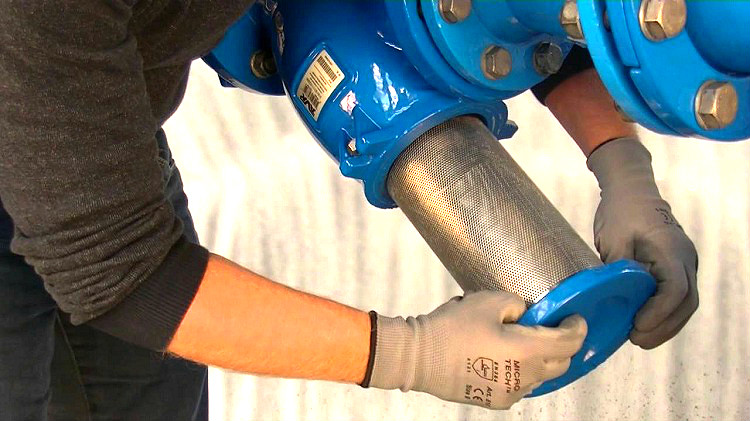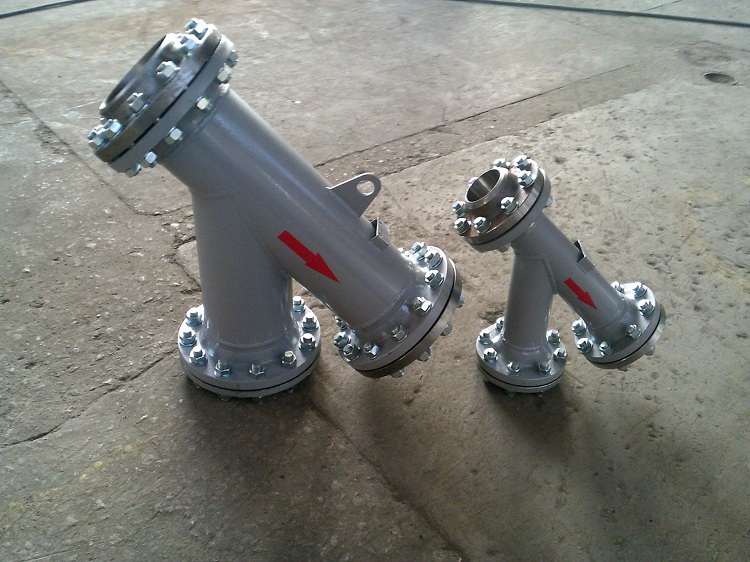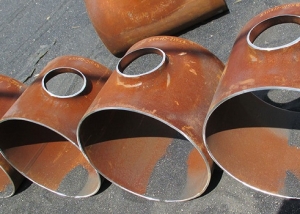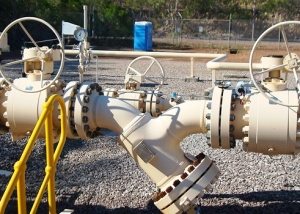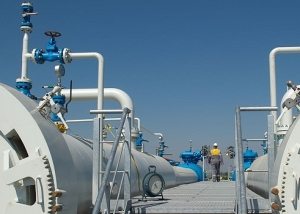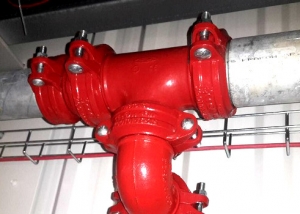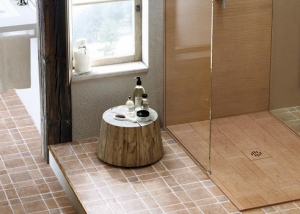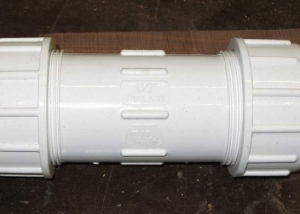Flanged mesh filter (FSF) is used for plumbing systems with high requirements for the fluid transported through them. It performs a cleaning function, retaining foreign particles in itself and preventing them from entering the pipeline elements (valves, counters, regulators, etc.). Such devices are used in various pipeline systems: heating, hot and cold water supply and others.
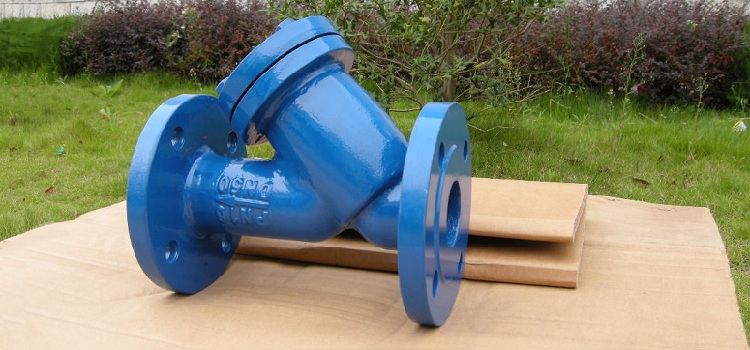
The filter is a necessary part of the water main, it cleans the working fluid from unwanted impurities
Content
Benefits
One of the important qualities of the strainer is its attractive price. In addition, this type of product is represented by a fairly simple design and is easy to install. The compactness and high reliability of the device also play an important role. It practically does not need care, and thanks to its small dimensions it can be installed in almost any place, including hard-to-reach ones.
Important! It is recommended that you check the device for clogging from time to time. If this is not done, sooner or later the device will clog completely and stop performing its water purification functions. To prevent undesirable consequences of filter contamination, it is necessary to periodically clean its mesh.
FSF composition and application features
The flange filter, as a rule, includes such elements:
- body.
- a grid, due to which water is purified from foreign particles.
- drain hole, which includes a special plug.
- a tap that performs the function of draining filtered sediments. Not available on all models.
- gasket.
- bolts for fastening flanges.
Installation of filters, as a rule, is carried out in front of various fittings in the pipeline, as well as pumps and measuring devices. Due to this, important elements of the pipeline do not become clogged and no precipitation forms on their walls. The filtering device takes all the blow.
The body of the device has a special pointer (arrow that determines the direction of fluid movement through the pipes). Filters are used for residential water mains and for any type of enterprises that have a variety of plumbing and drainage systems of a technical nature. When installing home pipelines, a brass product with the marking DN 15 is very popular. Its dimensions and diameter are ideal for metal-plastic pipes, which are usually installed in apartments. But its connection will be threaded or compression.
In addition to simple models, there is a mesh type grease filter that retains the oily components. At enterprises of any orientation, the devices DN 80 and DN 100 are very popular. Their use in production is a mandatory procedure and is required for safety. For purification of communal water use a device with a type of rough treatment. It filters water that is delivered directly from natural sources.
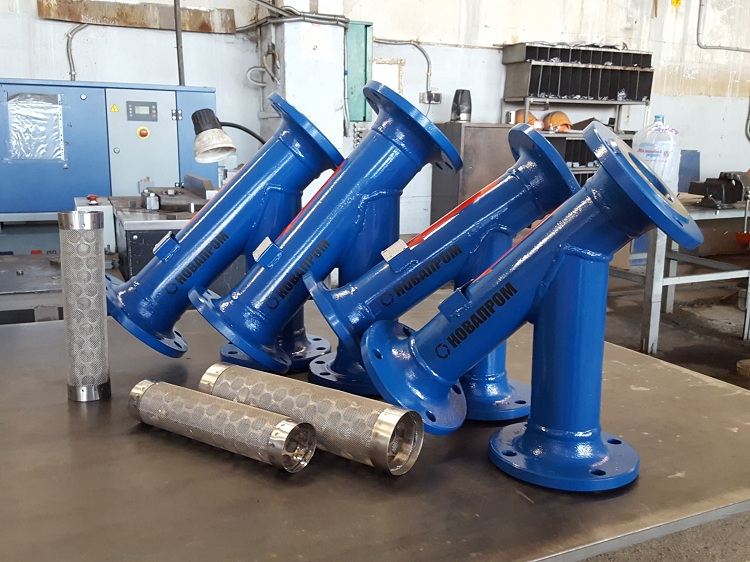
Filters are available in different diameters for installation in both domestic and industrial pipelines.
When extracting water from a well, a special mesh-type apparatus for wells is used. Well pumps easily fail if water has a sufficient hardness index and a high level of harmful impurities, so you can’t do without it in such conditions. Also, these filters are widely used in agricultural farms and factories.
The parameters of the existing flange strainers are presented in the table.
Table 1
| Filter | Conditional diameter (mm) | Working length (mm) | Weight, kg) |
| FSF | 200 | 540 | 76 |
| 150 | 440 | 50 | |
| 100 | 350 | 26 | |
| 80 | 290 | 14 | |
| 65 | 270 | 12 | |
| 50 | 220 | 9 | |
| 32 | 180 | 6 | |
| 25 | 160 | 5 | |
| FSFm | 200 | 540 | 78 |
| 150 | 440 | 52 | |
| 100 | 350 | 27 | |
| 80 | 290 | 15 | |
| 65 | 270 | 13 | |
| 50 | 220 | 10 |
Varieties of FSF
The main indicators by which filtering devices are differentiated are size, material, type of mesh, etc.
FSF is made from different materials: brass, cast iron, steel. Cast iron FSFs are used more often, because this type is most suitable for installation in enterprises. Steel products are widespread in the economic environment due to their lower mass and lower cost. Brass products, as mentioned above, are very popular in metal-plastic pipelines of residential premises. The price of a device, as a rule, depends on the material from which it is made.
Note! Some types of filters incorporate special magnets that are able to collect rust from water.
The main indicator by which customers choose filters is conditional diameter (DN). Devices are selected according to the diameter of the pipe on which the installation will be performed.
The shape of the FSF mesh can be cylindrical or conical. Devices with a mesh in the shape of a cone, as a rule, are used in systems with low pressure, since they have less hydraulic resistance. Filters with a cylindrical mesh, respectively, are installed in systems with high pressure.
The flange fixture is attached to the pipeline using special flanges and bolts, and the clutch filter - through couplings.
Some tips for choosing a suitable FSF
The main indicator by which the FSF is chosen is, of course, the size. However, it is worth paying attention to other equally important points:
1. When buying a filter, you should find out the maximum pressure indicator at which the device can function. It is desirable that the working pressure in the pipeline is less than the pressure indicator of the device.
2. The product documents must indicate the temperature of the medium that it can withstand. This indicator is no less important than the pressure of the medium.
3. When buying a filter, be sure to ask about the country in which it was manufactured. Products from well-known brands are better and more reliable, of course, if they are not fake. Very well established in the market, French and Danish manufacturers.
When choosing a flanged mesh filter, you should pay attention to a number of important parameters, such as: pressure, temperature, size and weight of the product. To buy a good and durable product, you should not save, but give preference to a well-known brand.
